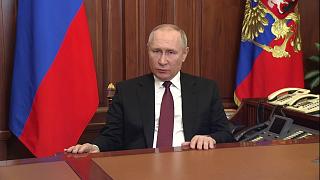
-
Published: 12 March 2022

Since the meeting of French President Macron and Putin at the Kremlin on 7 February, the French President has had 9 contacts with his Russian counterpart.
The Élysée Palace revealed some details of talks by French President Emmanuel Macron and German Chancellor Olaf Schultz with Russian President Vladimir Putin.
During a Saturday call with President Emmanuel Macron of France and Chancellor Olaf Schultz of Germany, an official of the French presidency said that the Russian President, Vladimir Putin, had no desire to end the war with Ukraine.
Today, on Saturday, the Élysée Palace announced that President Macron and the German Chancellor had spoken with Putin on the war in Ukraine, following the Versailles summit.
The French presidency noted that the telephone call had made possible a "very frank and difficult" discussion of developments in Ukraine, and that the French and German leaders had called on the Russian President to declare an "immediate ceasefire" and to lift the blockade of the Ukrainian city of Mariupol, where "the humanitarian situation has become intolerable."
Earlier today, the Kremlin revealed that the Russian President had briefed the French and German leaders during the call on "multiple cases of gross violations of the norms of international humanitarian law by Ukrainian forces," and urged Macron and Shults to "influence the Kiev authorities to put an end to such criminal acts."
The Europeans meeting at a summit in Versailles on Friday increased pressure on Russia to end its military offensive by waving new "large-scale" sanctions against Moscow and doubling arms financing for Ukraine.
According to the Elysée Palace, the Russian President "has not shown his intention to stop this war," prompting Paris to take new punitive action against Moscow within hours.
In a video posted by the Ukrainian presidency, Zelensky, Saturday, called on his French and German counterparts to help release the mayor of the Ukrainian city of Miletopol, who was kidnapped by the Russians the night before, according to Kiev.
